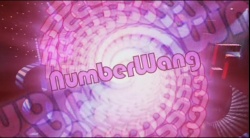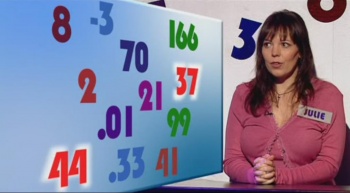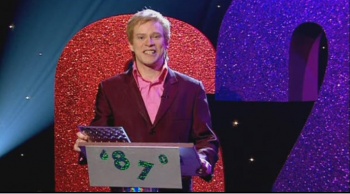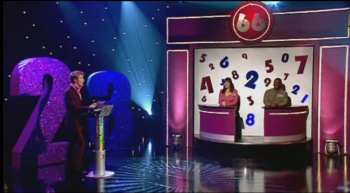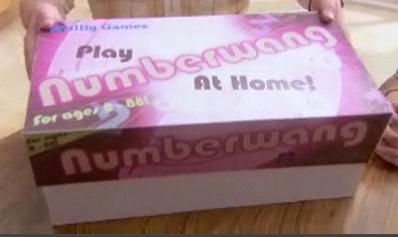NumberWang
(→Synopsis: add) |
|||
| Line 43: | Line 43: | ||
Robert Webb does a good job at keeping the pace going. In fact, at some points the speed might mean that those who don't get the NumberWang principle could find it a bit difficult to follow. | Robert Webb does a good job at keeping the pace going. In fact, at some points the speed might mean that those who don't get the NumberWang principle could find it a bit difficult to follow. | ||
| - | Nevertheless, this is a solid but simple quizzer with a decent turn of pace on the BBC at prime time, and that has to be welcomed. Hopefully a full series will follow soon. | + | Nevertheless, this is a solid but simple quizzer with a decent turn of pace on the BBC at prime time, and that has to be welcomed. Hopefully a full series will follow soon. (This looks unlikely, as David Mitchell later told ''Radio Times'', "Someone at BBC Choice once proposed, in all seriousness, to make a 24 x 30-minute series of ''Numberwang''. There was nothing to suggest they'd thought through what you'd do for half an hour of ''Numberwang'' and we didn't know where to start in expressing how completely they'd missed the point.") |
<div class="image">[[Image:Numberwang_set.JPG|350px]] | <div class="image">[[Image:Numberwang_set.JPG|350px]] | ||
Revision as of 09:56, 14 January 2021
Contents |
Host
Broadcast
Radio 4, 2003 (Pilot)
BBC Two, 14 September 2006 to 27 March 2008 (Series: 9 episodes in 2 series, as part of That Mitchell and Webb Look)
Synopsis
With the proliferation of Sudoku formats, it was only a matter of time before one of them was tried out on prime time BBC; in this case, a format that had been a two-minute filler on Radio 4 earlier in the decade. And so here we are with NumberWang.
Unlike the more complicated mathematical games, the rules are extremely simple. Two members of the public compete to be the first to complete a NumberWang, with each game lasting a few moves each. Perhaps it's easiest if we explain the rules by giving an example game:
- A: 3
- B: 9
- A: 16
- B: 12
- A: 8.2
- B: 4
- Host: That's NumberWang!
After a couple of warm-up rounds, we move to the Numbers board where the contestants have to select a combination of numbers that, in themselves, consist of a NumberWang. However, the twist here is that the numbers you ask for are in themselves NumberWanged, so you really have to think ahead. The graphics here are quite pleasing and well done for a low-budget show. Later in this round, you have to complete a mathematical statement using numbers from the board. If the contestant hits on the secret bonus, you get a Triple NumberWang.
When the hooter goes, the board revolves in the manner of Turnabout and we play WangerNumb. This is a tense head-to-head where you have to force your opponent to cause a WangerNumb. The first one to do wins and becomes the NumberWang for the day.
Robert Webb does a good job at keeping the pace going. In fact, at some points the speed might mean that those who don't get the NumberWang principle could find it a bit difficult to follow.
Nevertheless, this is a solid but simple quizzer with a decent turn of pace on the BBC at prime time, and that has to be welcomed. Hopefully a full series will follow soon. (This looks unlikely, as David Mitchell later told Radio Times, "Someone at BBC Choice once proposed, in all seriousness, to make a 24 x 30-minute series of Numberwang. There was nothing to suggest they'd thought through what you'd do for half an hour of Numberwang and we didn't know where to start in expressing how completely they'd missed the point.")
Catchphrases
"That's NumberWang!"
"Let's rotate the board!" (complete with hand-signal, natch)
Inventor
A Mitchell & Webb format by Mark Evans and James Bachman.
Merchandise
A NumberWang "board game in a box" was produced in 2008, including the board, numbers, two 400-sided dice, special hosting accessories and all 37 volumes of the rules so that you can say "That's NumberWang!" with confidence. For everyone from ages 8 to 88.

